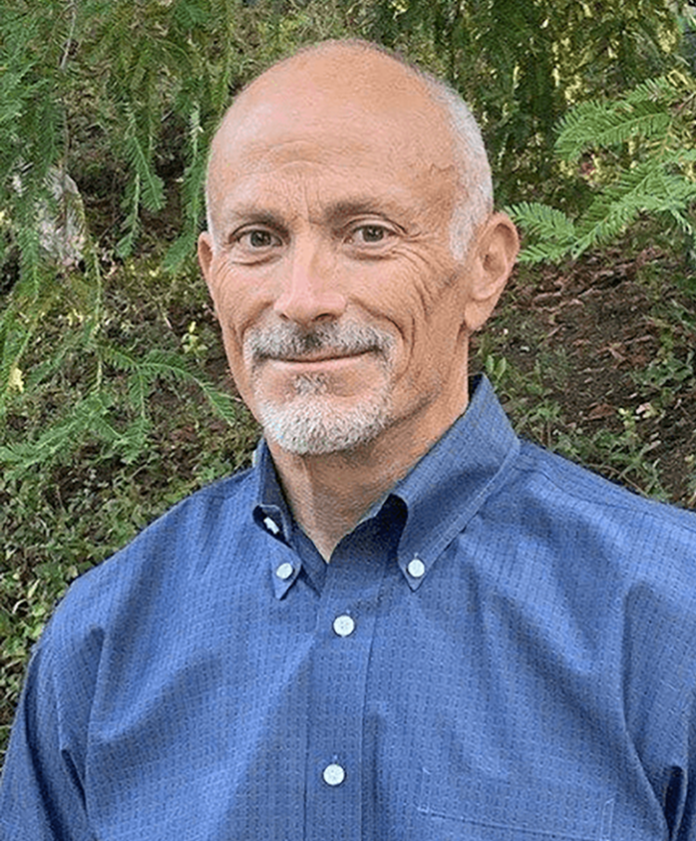
Dave Kiff, a Healdsburg resident with more than 40 years of experience in state and local government, has been named director of the county’s new Homelessness Services Division within the Department of Health Services (DHS).

In June, the Sonoma County Board of Supervisors approved moving the CDC’s Ending Homelessness team into the newly created Homelessness Services Division. The board also approved an additional $830,000 annually to support the consolidation and expand resources for the new division.
“This consolidation is an investment that will knock down silos and better support our community as a whole,” said Supervisor James Gore, chair of the Board of Supervisors. “It will provide critical housing resources for the unsheltered and is a major step toward the goal of ending homelessness.”
The Homelessness Services Division will consist of several pre-existing services programs, including the Homeless Encampment Assistance and Resource Team (HEART), the Project HOMEKEY Cohort, the Ending Homelessness Team and the Interdepartmental Multi-Disciplinary Team (IMDT).
Kiff’s selection was announced on Dec. 28 by Tina Rivera, director of the DHS. “Dave brings to this position strong collaboration skills and is equipped with a fresh perspective about homeless services and the Continuum of Care system within Sonoma County,” Rivera said. “We’re grateful to have someone with his knowledge and skill set to oversee this all-important new division.”
As interim director of the CDC since July 2021, Kiff has overseen, directed and coordinated Sonoma County’s affordable housing, homelessness, redevelopment and community development programs. This role also included managing all operations of the Sonoma County Community Development Commission, its Housing Authority and the former Redevelopment Agency.
Kiff took on the interim position with CDC, following Rivera herself, shortly after the county Board of Supervisors heard from consultants KPMG about ways to consolidate and streamline the management of homeless services.
One such recommendation was the creation of the new Homeless Services Division. “In addition to being the director of the CDC during that period, I worked with the rest of the county family on what homelessness services should look like,” he told the Tribune this week. When the role of homeless services director was listed, Kiff applied for and won the job. He officially begins on Jan. 10, 2023.
Manager Roulette
Kiff’s assumption of the new position comes not only after 18 months as the interim CDC director, but following three six-month interim city manager positions, two of them in Sonoma County. After a temporary role in Huntington Beach, he stepped in locally when long-time city manager David Mickaelain left to take a position as homeowners association manager in Truckee.
The duration of the interim positions was limited to six months because Kiff had officially retired from the state employment system (CalPERS) and could only take similar interim jobs.
But that doesn’t mean those six-month positions were without challenges. When Kiff became interim city manager in Healdsburg, he found himself facing several unique problems: The Black Lives Matter movement was gaining traction, and then-mayor Leah Gold was forced to step down in June 2020. Ozzy Jimenez was selected by the city council to replace her, and he eventually became mayor.
Then there was the pandemic. Kiff had to manage the city’s response to the health crisis and the impact it had on city finances, including the decline in income from the Transient Occupancy Tax, or TOT. “The bed tax fell pretty significantly, and we were trying to keep that from decimating the Parks and Recreation Department,” he said.
“The other thing was negotiation with Robert Green to make sure the Montage development was appropriately assigning its required public improvements,” including affordable housing, the park site and a fire station.
When that temporary stint was over, he went to fill a similar role in the City of Sonoma—which was then faced with the resignation of two of its five city council members, and had its own parklet and revenue problems to contend with during the pandemic.
In the council-manager style of local government—which most cities in California share—the hands-on administration of a jurisdiction is run through the manager’s office, which bridges the gap between politics and administration. But the city council, as elected by the citizens, offers direction, drafts and passes ordinances and general plans, and ultimately hires the city manager himself, or herself.
The bulk of Kiff’s public service has not been in Sonoma County, however, but in Orange County. He worked for the County of Orange, the City of Orange and lastly the City of Newport Beach, where he worked for 21 years and served as city manager for nine years. While there, he served on the homelessness Continuum of Care Board in Orange County, representing city managers.
Class of ’83
Kiff’s family moved to Healdsburg from Marin County when he was entering secondary school; he attended both the junior high and high school here (graduating in 1983), and later Santa Rosa Junior College. Kiff has a bachelor of science degree in business administration from California State University, Sacramento, and a master of government administration degree from the University of Pennsylvania.
In 2019, Kiff retired from the city manager position in Newport Beach, and moved back with his husband to the town where he grew up to be closer to his mother, though his father had passed away. The family produce farm in Alexander Valley, Ridgeview, still sells its goods in town at the Certified Farmers’ Market on Saturdays.
This wide experience has given the 58-year-old civil servant a welcome perspective on local problems, especially homelessness.
“I will say I think Healdsburg has been doing some remarkable things in the homelessness arena, including L&M Village,” Kiff told the Tribune. “I mean, that’s a really significant project.”
He went on to elaborate on one of the key tenets of homeless response. “There’s this concept of Functional Zero Homelessness, but we’re never going to end homelessness. We’re never going to prevent every last soul from losing their home. But the goal of Functional Zero is to say, when homelessness occurs, the person is rapidly rehoused, and it’s a one-time event for them, and it’s of brief duration.”
“Cities and counties across America are trying to embark on this effort because with Functional Zero, you end the chronic homelessness, which is the ones we see on our streets,” said Kiff. “And it’s so disconcerting to the individual who is homeless and to the people who see it, because there are people who are crying out for care due to mental illness or substance use disorder.
“I think Sonoma County is positioned in a place right now where the right people are in the right places, and I don’t mean me,” he added modestly. “I mean, people like Margaret Sluyk at Reach for Home and the leadership of the county government and the leadership of cities, and this commitment to building more projects like L&M.”
In June, the board approved moving the CDC’s Ending Homelessness team into the newly created Homelessness Services Division. The board also approved an additional $830,000 annually to support the consolidation and expand resources for the new division.
“This consolidation is an investment that will knock down silos and better support our community as a whole,” said Gore. “It will provide critical housing resources for the unsheltered and is a major step toward the goal of ending homelessness.”
Kiff’s base annual salary will be $178,880. He will receive this salary in addition to his vested pension as a state employee through the California Public Employees’ Retirement System, CalPERS.







